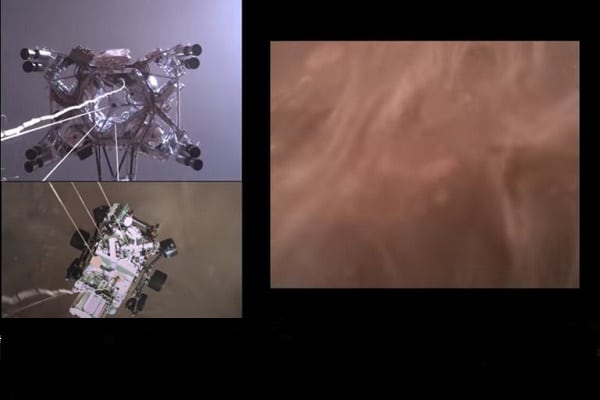
![]()
NASA released the first audio from Mars on Monday, a faint gust of wind captured by the Perseverance Rover. The first video of last week’s landing has also been shared by the US space agency, showing its first steps in searching for signs of past life on the red planet.
The microphone was unable to perform during the rover’s decent to the surface. Although, it managed to kick in and to capture audio once it landed. NASA engineers played the recording; where you can hear crackling audio, followed by a gust of wind.
"What you hear there 10 seconds in is an actual wind gust on the surface of Mars picked up by the microphone and sent back to us here on Earth," said Dave Gruel, Lead Engineer for the camera and microphone system on Perseverance.
The video clip lasts three just under three and a half minutes and was shot in high definition. It shows the deployment of a red-and-white parachute with a 70.5-foot-wide (21.5-meter-wide) canopy.
The astonishing footage shows the heat shield disengaging from the craft, which protected Perseverance during its entry into the Martian atmosphere. The rover landed in a cloud of dust in the Jezero Crater, north of the planet’s equator.
Michael Watkins is director of NASA's Jet Propulsion Laboratory, which is managing the mission. He and team members have been enthralled in the footage of these “really amazing videos”.
"This is the first time we've ever been able to capture an event like the landing on Mars," Watkins said. “These are really amazing videos! We binge-watched them all weekend”.
Thomas Zurbuchen, NASA's associate administrator for science, said the video of Perseverance's descent is "the closest you can get to landing on Mars without putting on a pressure suit”.
Perseverance was launched on July 30th, 2020 and landed on the surface of Mars on Thursday after more than 230 days. Its main objective will take just over two years, but it is likely to remain operational well beyond that. Its predecessor Curiosity is still functioning eight years after landing on Mars.
During its mission, Perseverance will attempt to collect 30 samples of rock and soil from the red planet to be sent back to Earth for lab analysis. The samples will be stored in sealed tubes, to be brought to Earth sometime in the 2030s. Mars had a warmer and wetter climate in its distant past. While previous exploration found that the planet was habitable, the job of Perseverance is to determine whether it was actually inhabited.
The craft is said to be about the size of an SUV and is equipped with a seven-foot-long robotic arm, 19 cameras, a pair of microphones, and a suite of cutting-edge instruments. It will begin drilling its first samples in summer, and along the way it will deploy new instruments to scan for organic matter, map chemical composition and zap rocks with a laser to study the vapor.
An experiment will take place, involving an instrument that can convert Mars' carbon dioxide atmosphere into oxygen, much like a plant. The hope is that humans will eventually not need to use oxygen on future trips, which is also crucial for rocket fuel.
The United States is preparing for an eventual human mission to the planet, though planning remains in the early stages. Earlier this year, the SpaceX Starship prototype exploded on landing. It was the second occasion in recent times that a SpaceX rocket has burst into flames on landing. The company owned by Elon Musk is attempting to bring people to the Moon and Mars in the coming years, but these test flights leave a lot to be desired.